
In all likelihood you have heard the acronym CBD in recent times. But what actually is it? CBD stands for cannabidiol, which is an active ingredient derived from the hemp plant. There are many proclaimed applications for CBD, however, the emergence of supportive research does not yet align with the marketing. Palmitoylethanolamide (also known as PEA), on the other hand, is naturally produced in the body and is a well-researched nutrient with evidence substantiating it as an alternative to CBD.
What is PEA?
PEA is an endocannabinoid-like compound found in almost every cell, tissue, and fluid in the body. A member of the N-acylethanolamineN-aclethanolamine (NAE) family, PEA serves as a repairing and protective molecule, supporting the body’s self-healing abilities. What makes PEA unique is its ability to hit different cellular targets simultaneously, which is why it’s often recommended to support myriad areas of health.

PEA: a CBD alternative
We consider PEA to be a well-researched alternative to CBD, and there is some evidence that PEA binds to more receptors in the body than CBD, resulting in a wider effect. There is also a better understanding of the long-term suitability of PEA as a supplement since it is naturally produced in the body, and this may explain the very low number of reports of unwanted effects found in any of the studies.
Why is sleep important?
In recent years, many experts have dubbed sleep the most important pillar of health. Sleep, it seems, affects every aspect of our wellbeing: energy, mood, immunity, and even weight. And yet, in our technologically-advanced, brightly-lit, sensory-overloaded era, many things can rob us of rest: the 24/7 news cycle, endless TV shows, social media, and late-night work emails.
Disrupted sleep
Modern lifestyle aside, persistent niggles and discomfort can also make it difficult to sleep. To relax into sleep, we rely on our nervous system to wind down. Experiencing discomfort, however, puts it into overdrive, which can affect our ability to fall asleep, as well as our sleep quality. Persistent niggles can also lead to shorter overall sleep time and frequent night-time awakenings (1). Rousing throughout the night can interrupt the progression of our sleep stages (light sleep, slow-wave sleep, and rapid eye movement), which we all need to cycle through to feel balanced and well-rested. And so, if your sleep is disrupted due to discomfort, you will feel tired, lethargic, and sluggish the next day.
Those who experience persistent niggles may also suffer from a self-perpetuating cycle of anxiety, low mood, soreness and insomnia. For instance, it’s not uncommon for someone with discomfort to become concerned and anxious when they can’t sleep. They may have a restless night and stir in the morning despondent and depressed, which is known to heighten sensitivity to discomfort (2). The following night, they may experience more discomfort, disrupting sleep and continuing the cycle.
PEA for sleep
Many people are turning to CBD to support sleep and manage discomfort but there’s a new kid on the block: Palmitoylethanolamide (PEA). Validated by more than 700 scientific studies and over 50 years of use, PEA may be the missing weapon in your sleep arsenal.
Aside from 400mg of Palmitoylethanolamide, our PEA Complex includes vitamins B12, B6 and B1, all of which contribute to the normal functioning of the nervous system and normal psychological function, making it an even better addition for sleep.
Learn more
Visit our sleep hub to find more information about sleep-related health.
References:
-
Finan. P.H., Goodin. B.R., Smith. M.T.. The association of sleep and pain: an update and a path forward. The journal of pain: official journal of the American Pain Society. 2013;14(12), 1539–1552.
-
Tang N. et al., Deciphering the temporal link between pain and sleep in a heterogeneous chronic pain patient sample: a multilevel daily process study. Sleep. 2012;35(5), 675–87A.
Related Posts

Olivia
Olivia Salter has always been an avid health nut. After graduating from the University of Bristol, she began working for a nutritional consultancy where she discovered her passion for all things wellness-related. There, she executed much of the company’s content marketing strategy and found her niche in health writing, publishing articles in Women’s Health, Mind Body Green, Thrive and Psychologies.
View More



